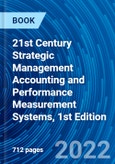The world's economy has suffered like never before first by COVID-19 and then by the Russia-Ukraine war. In such a difficult time, the role of Management Accounting and Performance Measurement Systems increases because organizations have to quest for alternative cost management practices in order to reduce and control costs and improve profitability. Organizations in the 21st century have been witnessing rapid changes in expanded regulatory requirements and technological advances.
These changes also impact accounting, it is essential to understand how Management Accounting and Performance Evaluation Systems are transforming locally and globally in order to reap proper opportunities. Environmental factors and organizational factors are believed to be an underpinning theory for challenges faced by management accountants in the 21st century. Needless to state that the role of Management Accounting and Performance Measurement Systems has been transforming the structure and processes of organizations and its acceptability has increased among internal stakeholders in improving the organizations' decision-making processes and performance.
This important subject has been embracing new avenues taking place both in theory and practice in view of emerging technologies. The usage of data analytics by accountants to support value creation is increasing. As a part of ethical practices and corporate social responsibility (CSR), organizations are obliged to report on incurring their environmental costs for mitigating the effects of pollution, climatic change, waste disposal, energy, and fuel consumption. Transformation in management accounting and control practices, adoption of innovative techniques such as activity-based costing and management, target costing, performance measurement systems, etc. particularly in the context of developing countries need to be researched in the twenty-first century in order to enhance our knowledge base in the context of competitive advantages of Management Accounting.
Value-based management (VBM) helps in making decisions that are helpful for the long-term financial performance. Target Costing (TC) enforces the management to transform their ways of thinking regarding the relation between product cost, selling price, and profitability in the organizations. Enterprise Risk Management (ERM) is to prepare a firm-wide strategy to identify and manage overall risks in all operational areas. Justifying investments with the capital budgeting process is of high importance for future growth and profitability for any organization. In this context, the cognitive heuristics and attendant biases that are likely to colour judgments pertaining to the selection and post-audit stages of investment decisions need to be considered.
Salient Features
- Provides understanding of how management accounting and performance measurement systems are transforming locally and globally in order to reap proper opportunities.
- Sheds light on the usage of data analytics by accountants to support value creation.
- Provides practical evidence on how businesses do keep account of environmental costs and how those are effectively managed in uplifting the overall profitability.
- Investigates the chief executive officer's narcissist leadership behaviors on organizational values and performance.
- Discusses how enterprise risk management can shape the role of management accountant and bring changes in management accounting scope.
- Explains how the cognitive heuristics and attendant biases are likely to colour judgments pertaining to the selection and post-audit stages of investment decisions.
- Discusses the increased role of activity-based costing and target costing as tools of cost management in organizations.








